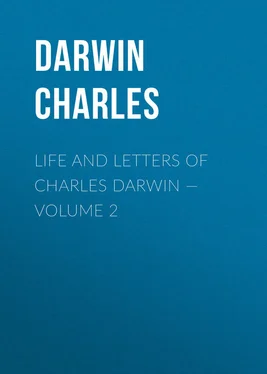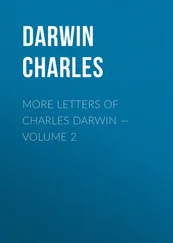Charles Darwin - Life and Letters of Charles Darwin — Volume 2
Здесь есть возможность читать онлайн «Charles Darwin - Life and Letters of Charles Darwin — Volume 2» — ознакомительный отрывок электронной книги совершенно бесплатно, а после прочтения отрывка купить полную версию. В некоторых случаях можно слушать аудио, скачать через торрент в формате fb2 и присутствует краткое содержание. Жанр: foreign_antique, foreign_prose, на английском языке. Описание произведения, (предисловие) а так же отзывы посетителей доступны на портале библиотеки ЛибКат.
- Название:Life and Letters of Charles Darwin — Volume 2
- Автор:
- Жанр:
- Год:неизвестен
- ISBN:нет данных
- Рейтинг книги:3 / 5. Голосов: 1
-
Избранное:Добавить в избранное
- Отзывы:
-
Ваша оценка:
- 60
- 1
- 2
- 3
- 4
- 5
Life and Letters of Charles Darwin — Volume 2: краткое содержание, описание и аннотация
Предлагаем к чтению аннотацию, описание, краткое содержание или предисловие (зависит от того, что написал сам автор книги «Life and Letters of Charles Darwin — Volume 2»). Если вы не нашли необходимую информацию о книге — напишите в комментариях, мы постараемся отыскать её.
Life and Letters of Charles Darwin — Volume 2 — читать онлайн ознакомительный отрывок
Ниже представлен текст книги, разбитый по страницам. Система сохранения места последней прочитанной страницы, позволяет с удобством читать онлайн бесплатно книгу «Life and Letters of Charles Darwin — Volume 2», без необходимости каждый раз заново искать на чём Вы остановились. Поставьте закладку, и сможете в любой момент перейти на страницу, на которой закончили чтение.
Интервал:
Закладка:
CHARLES DARWIN TO J.D. HOOKER. Down [23rd December, 1859].
My dear Hooker,
I received last night your 'Introduction,' for which very many thanks; I am surprised to see how big it is: I shall not be able to read it very soon. It was very good of you to send Naudin, for I was very curious to see it. I am surprised that Decaisne should say it was the same as mine. Naudin gives artificial selection, as well as a score of English writers, and when he says species were formed in the same manner, I thought the paper would certainly prove exactly the same as mine. But I cannot find one word like the struggle for existence and natural selection. On the contrary, he brings in his principle (page 103) of finality (which I do not understand), which, he says, with some authors is fatality, with others providence, and which adapts the forms of every being, and harmonises them all throughout nature.
He assumes like old geologists (who assumed that the forces of nature were formerly greater), that species were at first more plastic. His simile of tree and classification is like mine (and others), but he cannot, I think, have reflected much on the subject, otherwise he would see that genealogy by itself does not give classification; I declare I cannot see a MUCH closer approach to Wallace and me in Naudin than in Lamarck — we all agree in modification and descent. If I do not hear from you I will return the 'Revue' in a few days (with the cover). I dare say Lyell would be glad to see it. By the way, I will retain the volume till I hear whether I shall or not send it to Lyell. I should rather like Lyell to see this note, though it is foolish work sticking up for independence or priority.
Ever yours, C. DARWIN.
A. SEDGWICK (Rev. Adam Sedgwick, 1785-1873, Woodwardian Professor of Geology in the University of Cambridge.) TO CHARLES DARWIN. Cambridge, December 24th, [1859].
My dear Darwin,
I write to thank you for your work on the 'Origin of Species.' It came, I think, in the latter part of last week; but it MAY have come a few days sooner, and been overlooked among my book-parcels, which often remain unopened when I am lazy or busy with any work before me. So soon as I opened it I began to read it, and I finished it, after many interruptions, on Tuesday. Yesterday I was employed — 1st, in preparing for my lecture; 2ndly, in attending a meeting of my brother Fellows to discuss the final propositions of the Parliamentary Commissioners; 3rdly, in lecturing; 4thly, in hearing the conclusion of the discussion and the College reply, whereby, in conformity with my own wishes, we accepted the scheme of the Commissioners; 5thly, in dining with an old friend at Clare College; 6thly, in adjourning to the weekly meeting of the Ray Club, from which I returned at 10 P.M., dog-tired, and hardly able to climb my staircase. Lastly, in looking through the "Times" to see what was going on in the busy world.
I do not state this to fill space (though I believe that Nature does abhor a vacuum), but to prove that my reply and my thanks are sent to you by the earliest leisure I have, though that is but a very contracted opportunity. If I did not think you a good-tempered and truth-loving man, I should not tell you that (spite of the great knowledge, store of facts, capital views of the correlation of the various parts of organic nature, admirable hints about the diffusion, through wide regions of many related organic beings, etc., etc.) I have read your book with more pain than pleasure. Parts of it I admired greatly, parts I laughed at till my sides were almost sore; other parts I read with absolute sorrow, because I think them utterly false and grievously mischievous. You have DESERTED — after a start in that tra-road of all solid physical truth — the true method of induction, and started us in machinery as wild, I think, as Bishop Wilkins's locomotive that was to sail with us to the moon. Many of your wide conclusions are based upon assumptions which can neither be proved nor disproved, why then express them in the language and arrangement of philosophical induction? As to your grand principle — NATURAL SELECTION — what is it but a secondary consequence of supposed, or known, primary facts! Development is a better word, because more close to the cause of the fact? For you do not deny causation. I call (in the abstract) causation the will of God; and I can prove that He acts for the good of His creatures. He also acts by laws which we can study and comprehend. Acting by law, and under what is called final causes, comprehends, I think, your whole principle. You write of "natural selection" as if it were done curiously by the selecting agent. 'Tis but a consequence of the presupposed development, and the subsequent battle for life. This view of nature you have stated admirably, though admitted by all naturalists and denied by no one of common sense. We all admit development as a fact of history: but how came it about? Here, in language, and still more in logic, we are point-blank at issue. There is a moral or metaphysical part of nature as well a physical. A man who denies this is deep in the mire of folly. 'Tis the crown and glory of organic science that it DOES through FINAL CAUSE, link material and moral; and yet DOES NOT allow us to mingle them in our first conception of laws, and our classification of such laws, whether we consider one side of nature or the other. You have ignored this link; and, if I do not mistake your meaning, you have done your best in one or two pregnant cases to break it. Were it possible (which, thank God, it is not) to break it, humanity, in my mind, would suffer a damage that might brutalize it, and sink the human race into a lower grade of degradation than any into which it has fallen since its written records tell us of its history. Take the case of the bee-cells. If your development produced the successive modification of the bee and its cells (which no mortal can prove), final cause would stand good as the directing cause under which the successive generations acted and gradually improved. Passages in your book, like that to which I have alluded (and there are others almost as bad), greatly shocked my moral taste. I think, in speculating on organic descent, you OVER-state the evidence of geology; and that you UNDER-state it while you are talking of the broken links of your natural pedigree: but my paper is nearly done, and I must go to my lecture-room. Lastly, then, I greatly dislike the concluding chapter — not as a summary, for in that light it appears good — but I dislike it from the tone of triumphant confidence in which you appeal to the rising generation (in a tone I condemned in the author of the 'Vestiges') and prophesy of things not yet in the womb of time, nor (if we are to trust the accumulated experience of human sense and the inferences of its logic) ever likely to be found anywhere but in the fertile womb of man's imagination. And now to say a word about a son of a monkey and an old friend of yours: I am better, far better, than I was last year. I have been lecturing three days a week (formerly I gave six a week) without much fatigue, but I find by the loss of activity and memory, and of all productive powers, that my bodily frame is sinking slowly towards the earth. But I have visions of the future. They are as much a part of myself as my stomach and my heart, and these visions are to have their antitype in solid fruition of what is best and greatest. But on one condition only — that I humbly accept God's revelation of Himself both in his works and in His word, and do my best to act in conformity with that knowledge which He only can give me, and He only can sustain me in doing. If you and I do all this we shall meet in heaven.
I have written in a hurry, and in a spirit of brotherly love, therefore forgive any sentence you happen to dislike; and believe me, spite of any disagreement in some points of the deepest moral interest, your tru-hearted old friend,
Читать дальшеИнтервал:
Закладка:
Похожие книги на «Life and Letters of Charles Darwin — Volume 2»
Представляем Вашему вниманию похожие книги на «Life and Letters of Charles Darwin — Volume 2» списком для выбора. Мы отобрали схожую по названию и смыслу литературу в надежде предоставить читателям больше вариантов отыскать новые, интересные, ещё непрочитанные произведения.
Обсуждение, отзывы о книге «Life and Letters of Charles Darwin — Volume 2» и просто собственные мнения читателей. Оставьте ваши комментарии, напишите, что Вы думаете о произведении, его смысле или главных героях. Укажите что конкретно понравилось, а что нет, и почему Вы так считаете.












